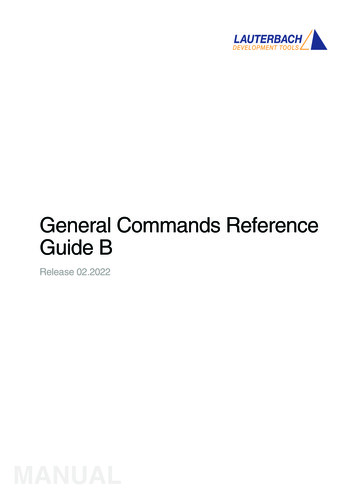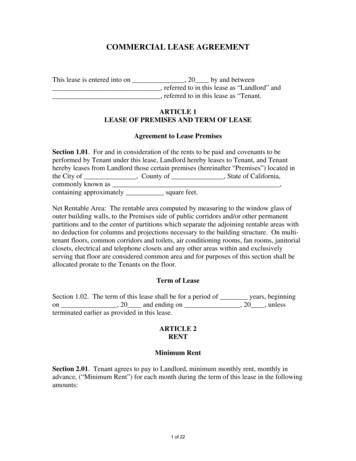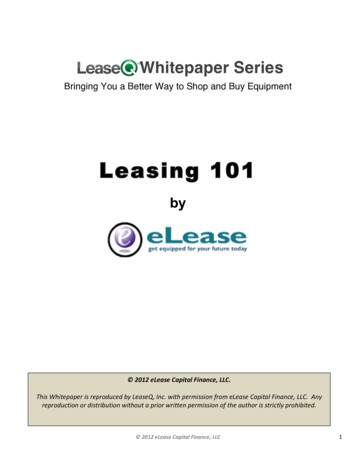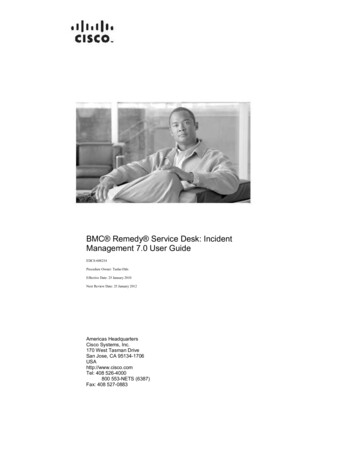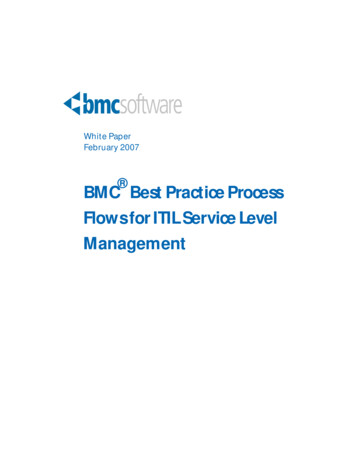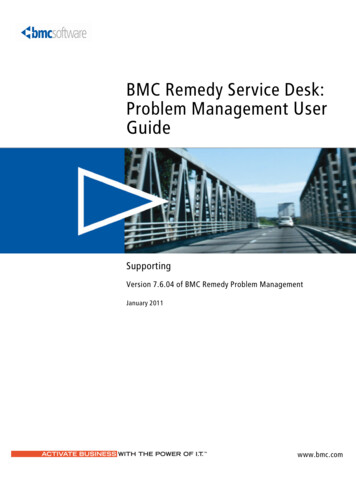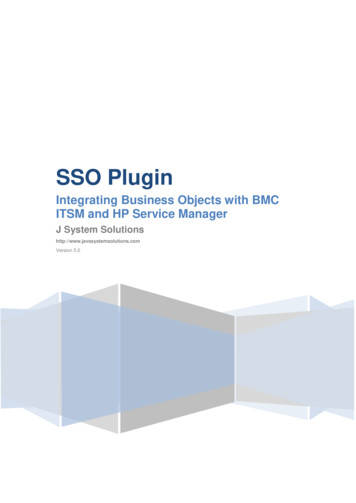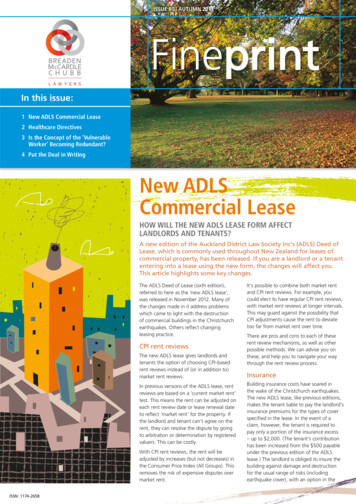
Transcription
ISSUE 60 AUTUMN 2013FineprintprintIn this issue:1 New ADLS Commercial Lease2 Healthcare Directives3 Is the Concept of the ‘VulnerableWorker’ Becoming Redundant?4 Put the Deal in WritingNew ADLSCommercial LeaseHOW WILL THE NEW ADLS LEASE FORM AFFECTLANDLORDS AND TENANTS?A new edition of the Auckland District Law Society Inc‘s (ADLS) Deed ofLease, which is commonly used throughout New Zealand for leases ofcommercial property, has been released. If you are a landlord or a tenantentering into a lease using the new form, the changes will affect you.This article highlights some key changes.The ADLS Deed of Lease (sixth edition),referred to here as the ‘new ADLS lease’,was released in November 2012. Many ofthe changes made in it address problemswhich came to light with the destructionof commercial buildings in the Christchurchearthquakes. Others reflect changingleasing practice.CPI rent reviewsThe new ADLS lease gives landlords andtenants the option of choosing CPI-basedrent reviews instead of (or in addition to)market rent reviews.In previous versions of the ADLS lease, rentreviews are based on a ‘current market rent’test. This means the rent can be adjusted oneach rent review date or lease renewal dateto reflect ‘market rent’ for the property. Ifthe landlord and tenant can’t agree on therent, they can resolve the dispute by goingto arbitration or determination by registeredvaluers. This can be costly.With CPI rent reviews, the rent will beadjusted by increases (but not decreases) inthe Consumer Price Index (All Groups). Thisremoves the risk of expensive disputes overmarket rent.ISSN: 1174-2658It’s possible to combine both market rentand CPI rent reviews. For example, youcould elect to have regular CPI rent reviews,with market rent reviews at longer intervals.This may guard against the possibility thatCPI adjustments cause the rent to deviatetoo far from market rent over time.There are pros and cons to each of theserent review mechanisms, as well as otherpossible methods. We can advise you onthese, and help you to navigate your waythrough the rent review process.InsuranceBuilding insurance costs have soared inthe wake of the Christchurch earthquakes.The new ADLS lease, like previous editions,makes the tenant liable to pay the landlord’sinsurance premiums for the types of coverspecified in the lease. In the event of aclaim, however, the tenant is required topay only a portion of the insurance excess– up to 2,000. (The tenant’s contributionhas been increased from the 500 payableunder the previous edition of the ADLSlease.) The landlord is obliged to insure thebuilding against damage and destructionfor the usual range of risks (includingearthquake cover), with an option in the
ISSUE 60 AUTUMN 2013lease to select between full replacement and reinstatement, orindemnity to full insurable value. The lease also allows the parties toagree that the landlord will take cover for some additional risks.If you’re entering a lease, you’ll need to carefully consider theinsurance provisions. They may need to be modified to suit yourparticular circumstances. Examples would be if insurance cover isn’tavailable for some risks, the premium is unaffordable for the tenant,or the insurance excess is too high or reimbursement of part of theexcess isn’t suitable.OutgoingsThe new ADLS lease, like previous editions, allows the landlord topass on certain costs to the tenant as ‘outgoings’. A change fromthe previous ADLS lease is that the landlord is now required to varythe proportion of outgoings payable by the tenant to ensure that itremains fair, for example, if circumstances change.The list of outgoings hasn’t changed greatly. The new ADLS lease,however, specifies that the following costs will not be passed onto tenants: Repairs to a building due to defects in design or construction,inherent defects in the building or renewal or replacement ofbuilding services Charges for repaving or resealing a car park, and Costs of upgrading, or other work, to make the buildingcomply with the Building Act 2004.Many landlords and tenants focus on rent, but don’t giveenough attention to outgoings, even though outgoings can becostly. It’s important to ensure the list of outgoings is modifiedwhere appropriate.Legal costsThe new ADLS lease requires each party to pay their own legal costsin relation to the preparation of the lease, and subsequent variationsand renewals. This differs from the previous edition, which requiredthe tenant to pay these costs.Landlord’s maintenanceThere have been a number of changes to maintenance provisions,including the addition of a specific requirement that the landlordkeep the building weatherproof. The landlord is also required tomaintain building services and to replace them if they can nolonger be maintained through regular maintenance.Landlord’s access for inspection and worksThe Christchurch earthquakes have highlighted issues that can ariseif a landlord needs extended access to premises to perform works.The new ADLS lease allows the landlord to require a tenant to vacatethe premises if this is reasonably required to enable works to becarried out. If a tenant is required to vacate, or the tenant’s businessis materially disrupted, there will be a fair reduction in the rent andoutgoings while the disruption continues. The landlord must act ingood faith when exercising this right of access.Who bears the cost of earthquakestrengthening work?The cost of earthquake-strengthening work has become animportant issue for many landlords. Under the previous edition ofthe ADLS lease, a landlord may be able to pass a percentage of22earthquake-strengthening costs on to a tenantunder the ‘improvements rent’ provision untilthe next rent review. However, landlords don’thave this ability under the new ADLS lease, as theimprovements rent provision has been removed.Access in emergenciesThe Christchurch earthquakes exposed anotherproblem in previous editions of the ADLS lease,which arose when premises were undamaged butcouldn’t be accessed. In this situation the leasearguably required the tenant to continue to pay rentand outgoings, even if they couldn’t access theirpremises. This led to disputes about whether thetenant could cancel their lease.The drafters of the new ADLS lease have tried toaddress this issue. If the tenant can’t access theirpremises due to an emergency, for example, if acordon is in place, the tenant will be entitled to afair reduction in the rent and outgoings until thepremises can be used again. If the situation continues for too long(nine months is the default period in the lease), either party will beentitled to terminate the lease.Reinstatement and chattels removalThe new ADLS lease contains several changes relating to therequirement for the tenant to remove its alterations and chattels,and reinstate the premises at the end of the lease.One useful addition is the option to attach a Premises ConditionReport, which is a report of the state of the premises at the start ofthe lease. This is a good way to reduce the risk of costly disputes atthe end of the lease about the state of repair to which the tenant isrequired to restore the premises.Bank guaranteesIf a tenant assigns their lease to an unlisted company, there is a newoption for security to be given to the landlord in the form of a bankguarantee, instead of personal guarantees from the new tenant’sprincipal shareholders.Some landlords are now requiring a bank guarantee from theoriginal tenant, although the new ADLS lease doesn’t provide forthis. Personal guarantees may be of limited worth if the peoplegiving them have limited assets, or have their assets tied up infamily trusts. In addition, some directors are unwilling to providepersonal guarantees.See a lawyer before you sign a leaseLandlords and tenants often enter leases without giving enoughattention to the fine print. Once the lease has been signed, it’s toolate to make changes. You may wish you had done so once youbecome aware of the full implications of the lease terms later on.Standard form leases are only a starting point. The ADLS lease isn’talways suitable and, when it’s used, it should be tailored to yoursituation. Whether you’re a landlord or tenant, you can benefit fromcustomising your lease.If you see us early in the process, we can work with you to negotiatelease terms which best suit your needs.
Healthcare DirectivesMAKING YOUR WISHES COUNT WHEN YOU NEED ITAs you head towards your senior years, you may startthinking about what options you have to let othersknow how you would like to address end of life issues– in this case, medical treatment. This article gives anoverview on what a healthcare directive does andhow it can be used.A health directive records your choices about future healthcareprocedures or medical treatment. It’s often used to record yourpreferences for controlling medical treatments such as those whichprolong life, but not attempting to cure an underlying terminalillness. Examples of this could be a Jehovah’s Witness memberrecording they’re not to be given a blood transfusion, or someonewith advanced multiple sclerosis refusing all treatments other thanthose meant to address pain or keep them comfortable.Your right to refuse medical treatment is acknowledged in theBill of Rights Act.“Involve your family in yourhealthcare directive decision-making”WHAT A HEALTHCARE DIRECTIVE IS NOTWILL MY WISHES BE FOLLOWED?In explaining what a healthcare directive does, it’s really easier toexplain what it doesn’t do. A healthcare directive is not:While everyone has the right to refuse to undergo any medicaltreatment, this right sometimes conflicts with a caregiver’sor doctor’s obligations to protect and sustain life. A medicalprofessional shouldn’t provide services that contradict a healthcaredirective unless there are reasonable grounds to doubt its validity.The key points for a validity test are: A Will: although also known as a living will, a healthcaredirective shouldn’t be confused with your Will which providesfor the management of your estate and distribution of yourassets after you die. An Enduring Power of Attorney for Personal Care and Welfare:a healthcare directive records, in advance, your wishes fortreatment in specific circumstances. In contrast, an EnduringPower of Attorney (EPA) for personal care and welfare empowersyour attorney to make all health and welfare decisions for youwhen you are mentally incapable of doing so yourself. Althoughyour attorney’s powers are broad, they can’t refuse standardmedical treatment intended to save your life – only you can refusesuch treatment (if that’s your wish).RECORD YOUR WISHESIt’s sensible to record your wishes in a written, signed and dateddocument; there’s no particular form or specific format required.As a starting point, you may want to talk with a trusted medicalprofessional, such as your GP; this will help clarify your options andpreferences. We can then work with you to draft a document thatrecords your wishes.LETTING PEOPLE KNOWYour healthcare directive will only be effective if the people whoneed to know about it are aware of its existence. Make sure you givecopies to anyone who may need to know your wishes in order tomake decisions about your care or treatment. These people could beyour family, or a very close friend, your GP or any caregivers you haveregular contact with. And remember to let us have a copy as well.We’d certainly recommend that you involve your family in yourhealthcare directive decision-making. Let them know your decisionsand the reasons for them – the more they know, the easier it will befor them to make sure your wishes are met when the time comes.3 Were you competent to make the decision at the time yousigned the directive? Was the decision made free from undue influence? Were you sufficiently informed to make your decision? Does your choice apply to the circumstances currently faced?You’re presumed to be competent unless there are reasonablegrounds for believing you may not be. Questions of competency,undue influence and information are easier to answer if it’s clearthat you’ve discussed your options with your doctors, have sharedyour views with your family or close friends, and have recorded yourwishes in your healthcare directive.TAKING CONTROLA healthcare directive is a useful tool to set out, in advance, yourpreferences for care; it will only apply if you’re unable to makedecisions for yourself. As long as you stay mentally capable, youcan revoke or replace it at any time.A healthcare directive deals with specific circumstances; it’s not asubstitute for other important documents to set out your end-of-lifewishes. We do recommend that you have EPAs for both personalcare and welfare, and property matters, so that decisions can bemade on your behalf if you’re no longer able to make them yourself.It’s also useful to review your current Will. If you don’t have a Will,now is a good time to record how you wish to be farewelled, andhow your assets and personal effects are to be distributed afteryour death.Remember that life and circumstances change, so it’s important toreview all of your personal documents regularly.
PROPOSED AMENDMENTS TO EMPLOYMENT RELATIONS ACTThe latter part of 2013 is set to herald the partial reform ofPart 6A of the Employment Relations Act 2000, which currentlyoffers special protection to people who are classified as ‘vulnerableworkers’. This article discusses why owners of small to mediumsized enterprises should be aware of the government’s proposals.The proposed legislative changes to the Employment Relations Actform part of a group of wider measures designed to expand therights of workers to request flexible working hours and to promotean environment which is more conducive to collective bargaining.But what, or more accurately ‘who’, is the ‘vulnerable worker’, andwhy is it particularly important for owners and/or potential ownersof small to medium sized businesses of less than 20 employees(SMEs) to be aware of the government’s proposed legislativeamendments?WHO ARE VULNERABLE WORKERS?The phrase ‘vulnerable worker’ is a colloquial term that describespeople employed in what are typically low paid jobs within thecleaning, catering, orderly and laundry industries. These categoriesof employees (and the circumstances in which they are covered),are set out in Schedule 1A of the Act.Part 6A of the Act is designed to provide continuity of employmentprotection for these workers. It also protects them from thepossibility of being replaced by cheaper contractors and/or fromhaving their remuneration and working conditions reduced if thecompany for which they work is either restructured or ultimatelysold. In these circumstances, the current legislation allows vulnerableemployees to choose to transfer their employment to the newemployer on the same terms and conditions as their previousemployment.The existing vulnerable workers’ provisions have been criticised forbeing difficult to understand and for creating uncertainty concerningstaffing levels, expenditure and inherited liabilities. Relating to theseconcerns is the belief that SMEs have faced greater proportionalcosts than larger businesses that have adapted more effectivelyto the current legal requirements.The Act currently applies to all New Zealand businesses,yet in what’s regarded as one of the more controversialamendments proposed by the government, SMEs willbe specifically exempted from Part 6A in instanceswhere they are the incoming employer. It’s estimatedthat employees in these businesses account forabout one quarter of the ‘vulnerable’ workforce. Thischange is likely to be welcomed by SME owners. Let’slook at an example below of how this might workfor those companies.CLEAN IT EXAMPLEUnder the current law a small cleaning company(Clean It Limited) which successfully tenders fora cleaning contract may be required to retainany cleaners previously employed by the formercontract owner. Not only does this mean that4there’s potential for Clean It to inherit underperforming employees,but it also exposes Clean It to a greater risk of unanticipated financialliabilities generated by the transfer process.According to the proposed amendments, Clean It would be entitledto cherry-pick any staff who they wished to retain; the companywould no longer have an obligation either to employ cleanersaffected by the restructuring, or to meet any of their entitlementsunder their existing employment agreements. In these circumstancesbusinesses like Clean It will no longer have the same compliancecosts and are likely to have an advantage over larger companies inthe tendering process.UNFAIR SAY LARGE BUSINESS OWNERSNot everyone, however, is as enthused about the proposed reformsas the majority of SME owners are likely to be. The existing lawsdesigned to protect vulnerable workers will still apply to largebusinesses. Commentators have argued that the disparate treatmentof employers under the proposed changes is anti-competitive andacts as a barrier to productivity.It’s perhaps therefore unsurprising that business lobby groupssuch as the Business Roundtable and Business New Zealand havefrom the outset argued that all of Part 6A should be repealed. Inthe meantime, it will be interesting to see what sort of corporatestructures arise in order to circumnavigate the continued applicationof Part 6A.To find out more about how the proposed amendments to Part 6Amay affect your business, go to the Ministry of Business, Innovationand Employment’s website at www.dol.govt.nz, or feel free tocontact us.
ISSUE 60 AUTUMN 2013NZ LAW Limited is an association ofindependent legal practices with memberfirms located throughout New Zealand.There are 61 member firms practising inover 70 locations.Put theDeal in WritingGETTING WHAT YOU EXPECTAn old adage is that verbal contracts are not worth the paper that they arewritten on. Many people believe that using a lawyer for what appears tobe a simple deal is costly and time consuming. Much simpler and faster tocomplete the deal on a hand shake and the parties will be good to their word.Unfortunately, when things go awry, verbal deals often leave some of the termsunstated and the parties have different views on what they actually agreed.Having your lawyer put the deal into an agreement, a letter or even merelyadvising by phone can clarify things to the parties; it will help ensure all aspectsare taken into account. Often, once a deal has been put into a draft Agreementand the parties get a chance to review what they have supposedly agreed upon(before it’s signed), there are often changes to be made as unforeseen issuesoften arise which have previously gone unconsidered.FREQUENT DISPUTES‘Standing grass’ is always a favourite for a rural dispute. A recent situation had avendor selling grass by the bale per kilogram of dry matter (kg/dm). The basis ofthe deal in the vendor’s eyes comprised 30 per bale, for 4x4 foot round bales,weighing in on average 200kg per bale. Over time the discussion moved fromcharging by kg/dm per bale to a price per bale. Eventually the grass was cut andbaled, except the bales were large square bales weighing on average 300 kg.The price offered by the purchaser was the 30 per bale rate. The issue was theterms of their agreement; was it price per kg/dm or price per bale? Each side hadpresumed their interpretation was correct; a difference that would have beenobvious if it had been committed to writing.Another situation is where land is leased for a set term at a fixed annualprice, with the owner responsible for paying the rates. An owner can overlookthat that the rates will increase annually, effectively decreasing the paymentbeing received each year. Something they never intended when the agreementwas made.A final example is where a purchaser agrees that chattels or stock can be left orstored at the property being purchased until the vendor can arrange for them tobe collected. Often this is left open-ended without any agreement as to a pick update or some form of rental charge if they aren’t collected within a reasonableperiod of time. With no formal agreement, the new property owner may findthat they are storing the items or feeding stock not only for free but also for along time.AN AGREEMENT CAPTURES THE FACTSOften a discussion with us before the negotiations start will ensure that you’rebest placed to capture the key aspects of the deal. It’s also likely that we’ll raiseother matters which you may not have considered. Investing a bit of time andmoney at an early stage in negotiating a deal and getting a written agreementis always worth the paper it’s written on.“A written agreement is alwaysworth the paper it’s written on.”5NZ LAW member firms have agreed toco-operate together to develop a nationalworking relationship. Membership enablesfirms to access one another’s skills,information and ideas whilst maintainingclient confidentiality.Members of NZ LAW LimitedAllen Needham & Co Ltd – MorrinsvilleArgyle Welsh Finnigan – AshburtonBannermans – GoreBarltrop Graham – FeildingBerry & Co – Oamaru & QueenstownBoyle Mathieson – HendersonBreaden McCardle Chubb – ParaparaumuCorcoran French – Christchurch & KaiapoiCruickshank Pryde – Invercargill, Otautau& QueenstownCullinane Steele Limited – LevinDaniel Overton & Goulding – Auckland& DevonportDG Law Limited – PakurangaDorrington Poole – DannevirkeDownie Stewart – DunedinDowthwaite Law – RotoruaEdmonds Judd – Te AwamutuEdmonds Marshall – MatamataAJ Gallagher – NapierGawith Burridge – Masterton &MartinboroughGifford Devine – Hastings & Havelock NorthGillespie Young Watson – Lower Hutt &WellingtonGreg Kelly Law Ltd – WellingtonHannan & Seddon – GreymouthHorsley Christie – WanganuiHunter Ralfe – NelsonInnes Dean-Tararua Law – Palmerston North& PahiatuaJackson Reeves – TaurangaJames & Wells Intellectual Property –Hamilton, Auckland, Tauranga& ChristchurchJohnston Lawrence Limited – WellingtonKaimai Law Bethlehem – BethlehemKnapps Lawyers – RichmondKennedy & Associates – MotuekaKoning Webster – TaurangaLamb Bain Laubscher – Te Kuiti &OtorohangaLaw North Limited – KerikeriLe Pine & Co – Taupo & TurangiLowndes Jordan – AucklandMackintosh Bradley & Price – ChristchurchMactodd – Queenstown, Wanaka & LytteltonMike Lucas Law Firm – ManurewaNorris Ward McKinnon – HamiltonNorth South Environmental Law –Auckland & QueenstownDavid O’Neill, Barrister – HamiltonOlphert & Associates Limited – RotoruaOsborne Attewell Clews – WhakataneWayne Peters Lawyers – WhangareiPurnell Jenkison Oliver – Thames & WhitiangaRSM Law Limited – TimaruRennie Cox – AucklandChris Rejthar & Associates – TaurangaSandford & Partners – RotoruaSimpson Western – Takapuna, North Harbour& SilverdaleSumpter Moore – Balclutha & MiltonThomson Wilson – WhangareiTill Henderson – New Plymouth & StratfordWadsworth Ray – AucklandWain & Naysmith Limited – BlenheimWalker MacGeorge & Co – WaimateWelsh McCarthy – HaweraWilkinson Adams – DunedinWoodward Chrisp – GisborneFineprint is printed on Advance Laser Offset, a paperproduced using farmed eucalyptus trees and pulp fromWell Managed Forests – manufactured in an ISO14001and ISO9001 accredited mill.
PostscriptNew telephone service for the hearing impairedHearing impaired Kiwis can now use a caption-based telephone service that willallow them to easily take part in a telephone conversation at almost the samespeed as ordinary conversations. Captions are generated and transmitted almostsimultaneously over the internet, with a delay of around two seconds.First introduced in the USA, the service has been available in this country since thebeginning of March. Using a special Captel phone, the hearing impaired can nowtalk to someone and then read (on a small screen on the phone itself) word-for-wordcaptions of the other person’s response.PARTNERSDon BreadenJohn McCardleStephen ChubbGraham MowbrayThe service is available every day between 8am and 9pm.A Captel phone is available for a one-off loan fee of 323, a 50% discount off thefull price; it’s subsidised by the government. The phone remains the property of theMinistry of Business, Innovation and Employment. There’s no cost for users to operatethe Captel service.CONSULTANTSAlf FairbairnPeter QuinnTo find out more, go to www.captel.co.nz.Do’s and don’ts of daily dealsSOLICITORSNikki CoulstonFiona GreenRebecca HodgeSophie KinsellaWebsites offering daily deals are now almost commonplace for many of us. Every daythere are tempting deals or offers that pop into our Inboxes. How hard is it to resistwhat seems to be a bargain?There are truly some great deals in these daily offers, but not all deals are createdequal. The Commerce Commission and Ministry of Consumer Affairs regularly receivecomplaints from customers who have found not all is as it appears for some offers.As with any offer, it always pays to keep your wits about you and do your homework.The Ministry of Consumer Affairs has given some guidelines:Do check if the deal is as good as it says it is: Look at the regular price, as well ascheck out the competition. A quick internet search should do the trick. If the discountis exaggerated or any of the information is misleading, you can report the company tothe Commerce Commission.Don’t stand for poor quality: Whether you buy the deals at full price or at a discountor sale price, all offers must comply with the Consumer Guarantees Act. Goods mustbe of acceptable quality and fit for the particular purpose, and services must beprovided with reasonable care and skill.Do resist an impulse buy: Tempting as it is to grab one of these deals on the spot,take a few minutes to think if you really need the Belgian waffle-making set.LEGAL EXECUTIVESRoz GloverLibby SpiersGreg McCardleRobyn BurchGENERAL MANAGERMark Kennedywww.bmc-law.co.nzDon’t be fobbed off: If you have a problem with something you’ve bought on one ofthese daily deals, ask the discount site or provider to put it right. If you’re not satisfiedyou can take your complaint to the Commerce Commission or the Disputes Tribunal.44C Ihakara StreetParaparaumuPO Box 140Paraparaumu 5254What commonly occurs is that so many people take up the offer that the company isoverwhelmed and has difficulty supplying the goods or services within the timeframeor at all. Persevere with the provider, they may be able to offer a time extension oryou may be able to ask for your money back.T 04 296 1105F 04 297 3231E info@bmc-law.co.nzRead the terms and conditions: How many times have we said this in Fineprint? Readthe t’s and c’s carefully every time you accept a deal.These daily deals are a fun way to give yourself a treat or to get a bargain. But thinkcarefully about the offer and take a deep breath before you press the BUY button.DISCLAIMER: All the information published in Fineprint is true and accurate to the best of the author’s knowledge. It should not be a substitute for legal advice. No liabilityis assumed by the authors or publisher for losses suffered by any person or organisation relying directly or indirectly on this newsletter. Views expressed are the views of theauthors individually and do not necessarily reflect the view of this firm. Articles appearing in Fineprint may be reproduced with prior approval from the editor and credit beinggiven to the source.Copyright, NZ LAW Limited, 2013. Editor: Adrienne Olsen. E-mail: adrienne@adroite.co.nz. Ph: 04-496 5513. Illustration: Scott Kennedy, Three Eyes.
Lease, which is commonly used throughout New Zealand for leases of commercial property, has been released. If you are a landlord or a tenant entering into a lease using the new form, the changes will affect you. This article highlights some key changes. The ADLS Deed of Lease (sixth edition), referred to here as the 'new ADLS lease',
